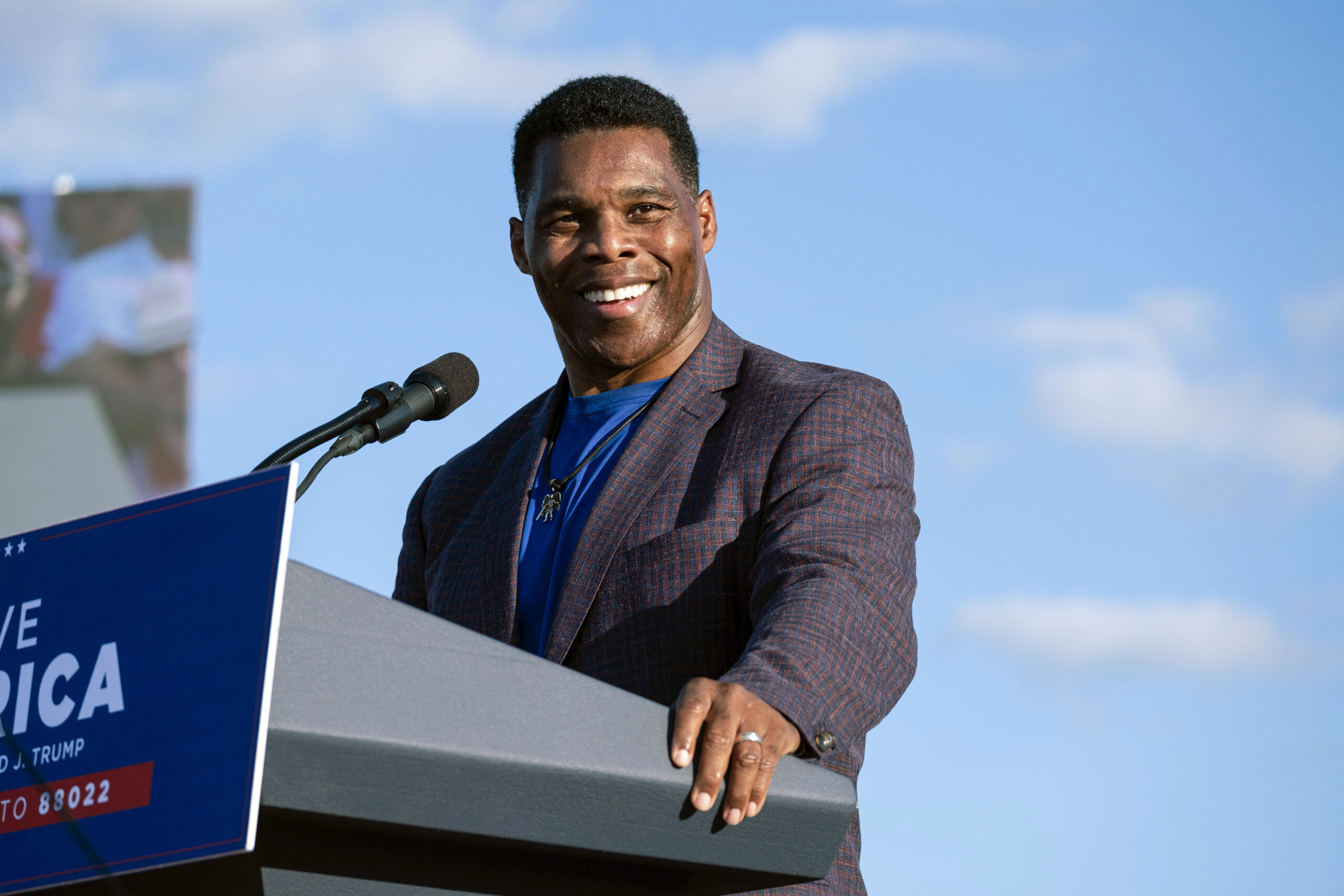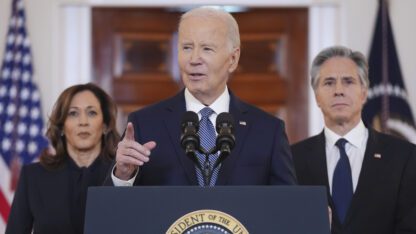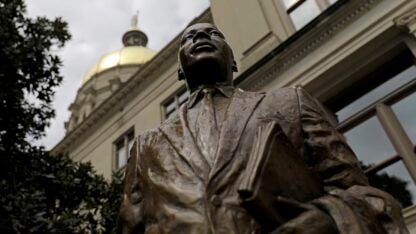Senate Minority Leader Mitch McConnell on Wednesday endorsed Herschel Walker for the Senate in Georgia, lending the clout of the highest-ranking elected GOP official in the country to the candidacy of a former football star whose turbulent personal history could create problems for his general election campaign.
Walker is the odds-on favorite to win the Republican primary next May and at an initial glance seems to have a coveted political profile as he seeks the chance to unseat Democrat Raphael Warnock, the state’s first Black senator, and help the GOP regain control of the Senate.
Walker was a football hero at the University of Georgia before a long NFL career. He’s a business owner whose chicken products are widely distributed. And he’s a Black conservative with backing from former President Donald Trump, a longtime friend who repeatedly urged Walker to run.
But he also has a lengthy history of mental health struggles, much of which Walker detailed in his autobiography. An investigation by The Associated Press in July revealed accusations that Walker repeatedly threatened his ex-wife’s life, exaggerated claims of financial success and alarmed business associates with unpredictable behavior.
McConnell, R-Ky., was initially cool to a Walker candidacy. But by endorsing him now, McConnell can sidestep what could have been a messy intraparty fight with Trump that might have complicated the quest to retake a Senate majority.
“I am happy to endorse Herschel Walker for U.S. Senate in Georgia,” McConnell said in a statement. “Herschel is the only one who can unite the party, defeat Senator Warnock, and help us take back the Senate. I look forward to working with Herschel in Washington to get the job done.”
Walker was effusive in his own statement, praising McConnell’s “commitment to bringing the party together toward the collective goal of defeating Senator Warnock.”
“The Democrats have already said they will spend whatever it takes to keep Georgia blue,” Walker said. “The stakes have never been higher — if we all work together, we will win next November, and take back the Senate. Team Herschel is very thankful for Senator McConnell’s support.”
The 2022 Senate race is shaping up as one of the most heavily contested races of the election cycle. Georgia, long solid GOP territory, became a top battleground after Democrat Joe Biden carried it last year in the presidential election in November. Democrats then took both Senate seats in run-off elections in January.
Warnock won a special election to fill out the remainder of the term of Republican Sen. Johnny Isakson, who retired, and will have to run in 2022 for a six-year term.
A number of Republicans quickly lined up to enter the primary. But Walker, who cryptically teased a candidacy for months, effectively froze the field because of his close affiliation with Trump.
Walker launched his campaign in late August and is one of a handful of Trump-backed candidates who have raised GOP worries because they received minimal screening before earning the former president’s endorsement.
Walker disclosed his mental illness in a 2008 book, “Breaking Free,” detailing a diagnosis of dissociative identity disorder. In that account, Walker told of as many as a dozen personalities — or “alters” — that he had constructed as a defense mechanism against the bullying he said he endured as a stuttering, overweight child.
The National Alliance on Mental Illness describes the disorder as “alternating between multiple identities,” leaving a person with “gaps in memory of every day events.” It notes men with the disorder often “exhibit more violent behavior rather than amnesia.”
In his book, Walker acknowledged violent urges. He wrote that he played Russian roulette and recalled sitting at his kitchen table in 1991 pointing a gun, loaded with a single bullet, at his head. “I wasn’t suicidal,” Walker explained, but “just looked at mortality as the ultimate challenge.”
Walker pitched a turnaround story, saying he decided in 2001 that “it was time to stop running and face some harsh realities.” He cited therapy and his Christian faith as influences.
His watershed moment: driving his car to confront a man who had “messed up my schedule” and thinking about what it would be like to shoot the man. Walker changed course, he wrote, after seeing a bumper sticker with the message “SMILE. JESUS LOVES YOU.”
Yet Walker’s violent behavior continued well after the 2001 revelation and his efforts to get help, according to court records obtained by the AP.
Walker’s ex-wife, Cindy Grossman, noted his outbursts in their divorce proceedings, telling of “physically abusive and threatening behavior.” In 2005, four years after she had sued for divorce, Grossman returned to the court for a protective order after Walker repeatedly voiced a desire and an intent to kill her and her boyfriend.
According to an affidavit from Grossman’s sister, Maria Tsettos, Walker called looking for his ex-wife while she was out with her new boyfriend. Tsettos took the call and said Walker became “very threatening” when told of Grossman’s whereabouts. In Tsettos’ recollection, Walker “stated unequivocally that he was going to shoot my sister Cindy and her boyfriend in the head.”
Walker contacted Tsettos another time and repeated the threats in graphic terms, and, according to Grossman’s account to the court, Walker confronted her in public later that day: He “slowly drove by in his vehicle, pointed his finger at (her) and traced (her) with his finger as he drove.”
In granting a protective order against Walker, a Texas judge stripped Walker’s rights to possess a firearm for a time.
Concerns about Walker’s behavior carried into his chicken business, now known as Renaissance Man Food Services, according to court filings.
Walker has said his company employed hundreds of people, included chicken processing plants in Arkansas and grossed $70 million to $80 million annually in sales. Yet when Walker applied for the federal Paycheck Protection Program last year, his company reported just eight employees, receiving $182,000 in aid.
In a recent court case, Walker indicated the company averaged about $1.5 million in yearly profit from 2008 to 2017. Meanwhile, Walker’s business associates testified in the same case that he does not own chicken processing plants, as he claims. Instead, they described him as a licensing partner who lends his name to the enterprise.
Records generated in a 2018 wrongful termination suit — the employee ultimately lost — depict Walker as a temperamental and unreliable partner.
Walker’s primary rivals pledged to forge on, despite McConnell’s endorsement.
“We’re in this race to win it, we’re Georgia’s candidate (not the Swamp’s),” said Georgia’s agriculture commissioner Gary Black, who compared his campaign to the Atlanta Braves’ unexpected World Series run. “Our mindset today is the same as the #Braves: Kill the narrative.”









